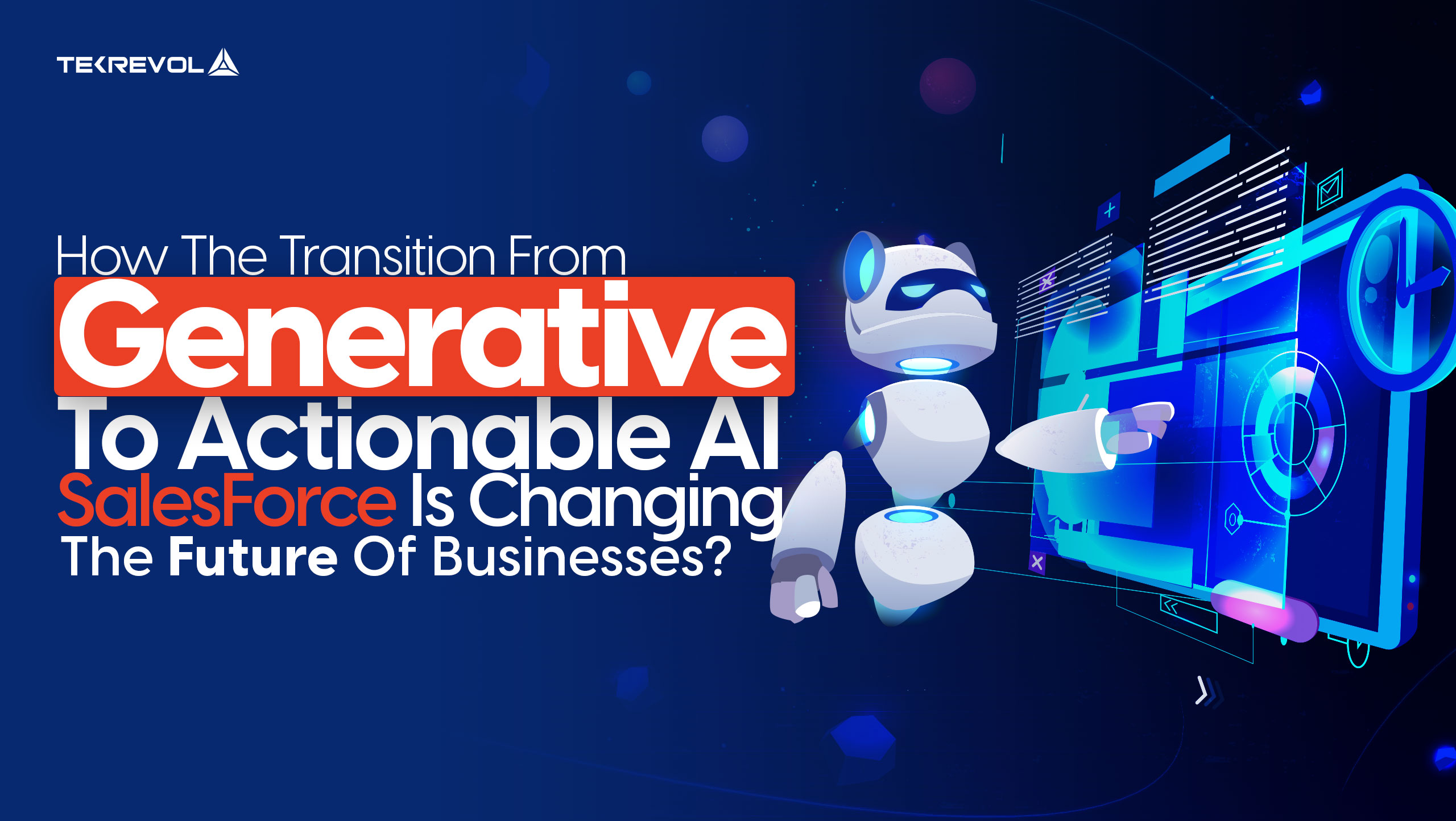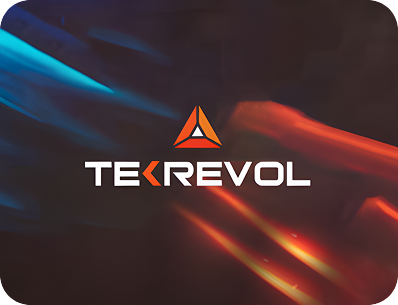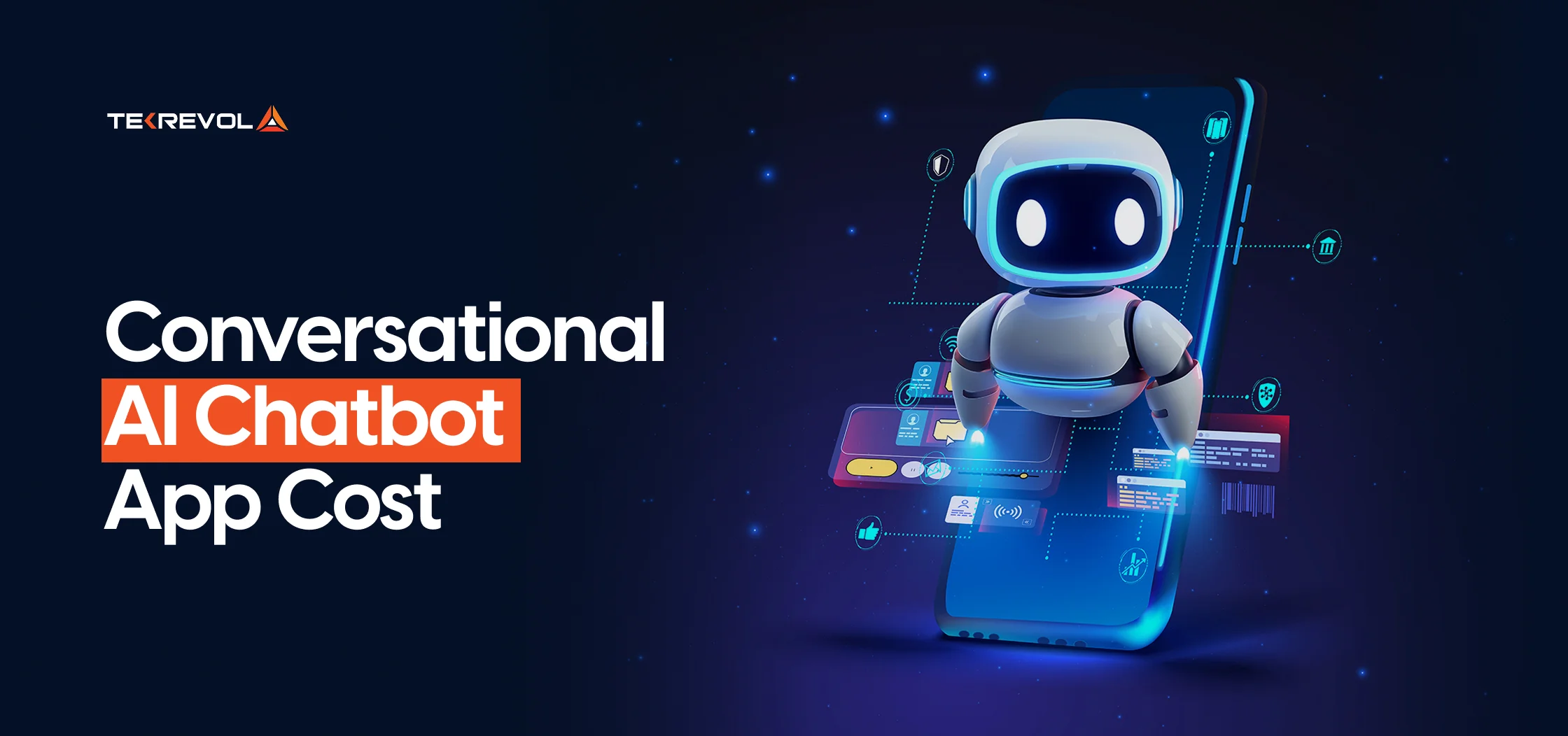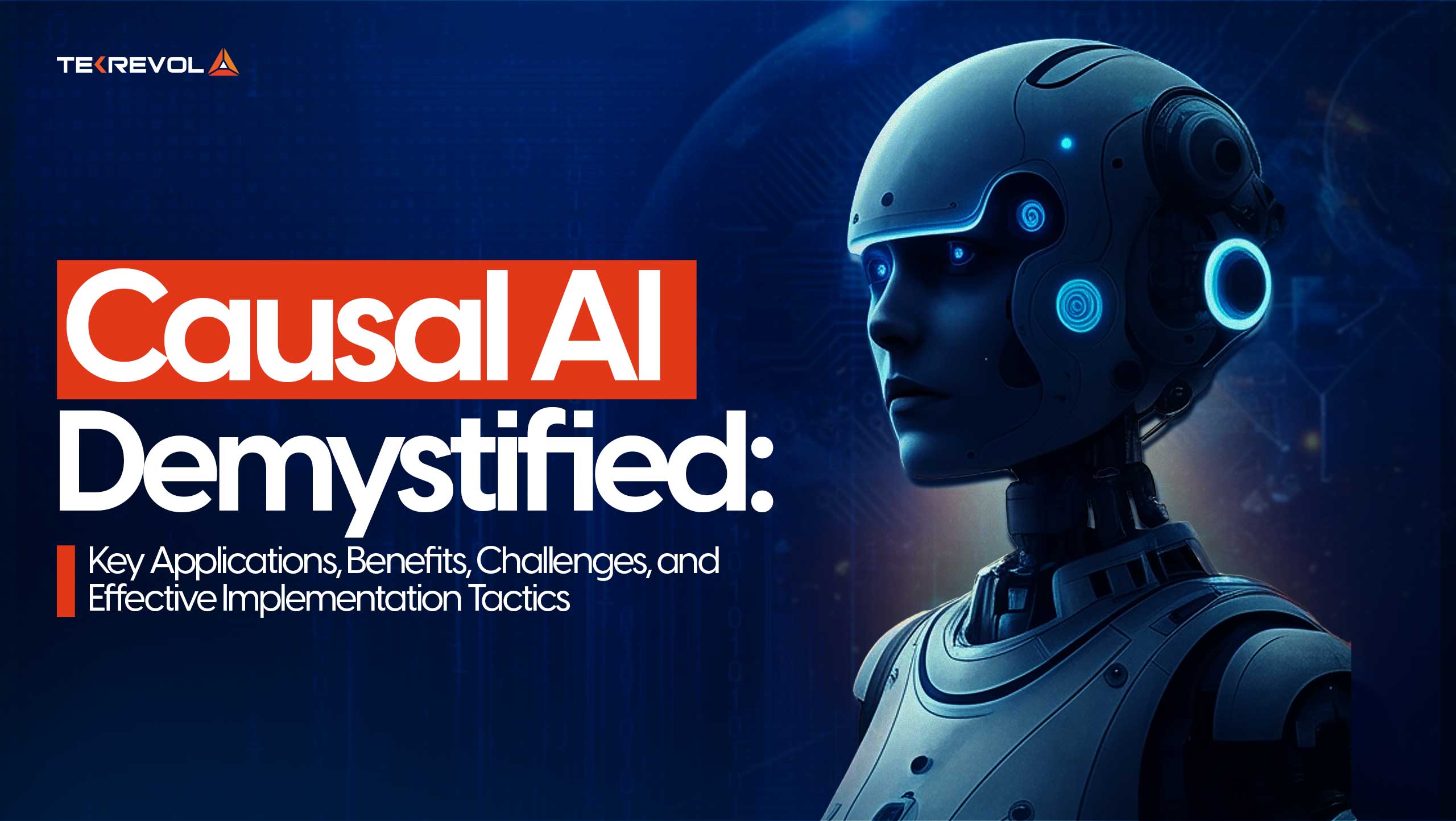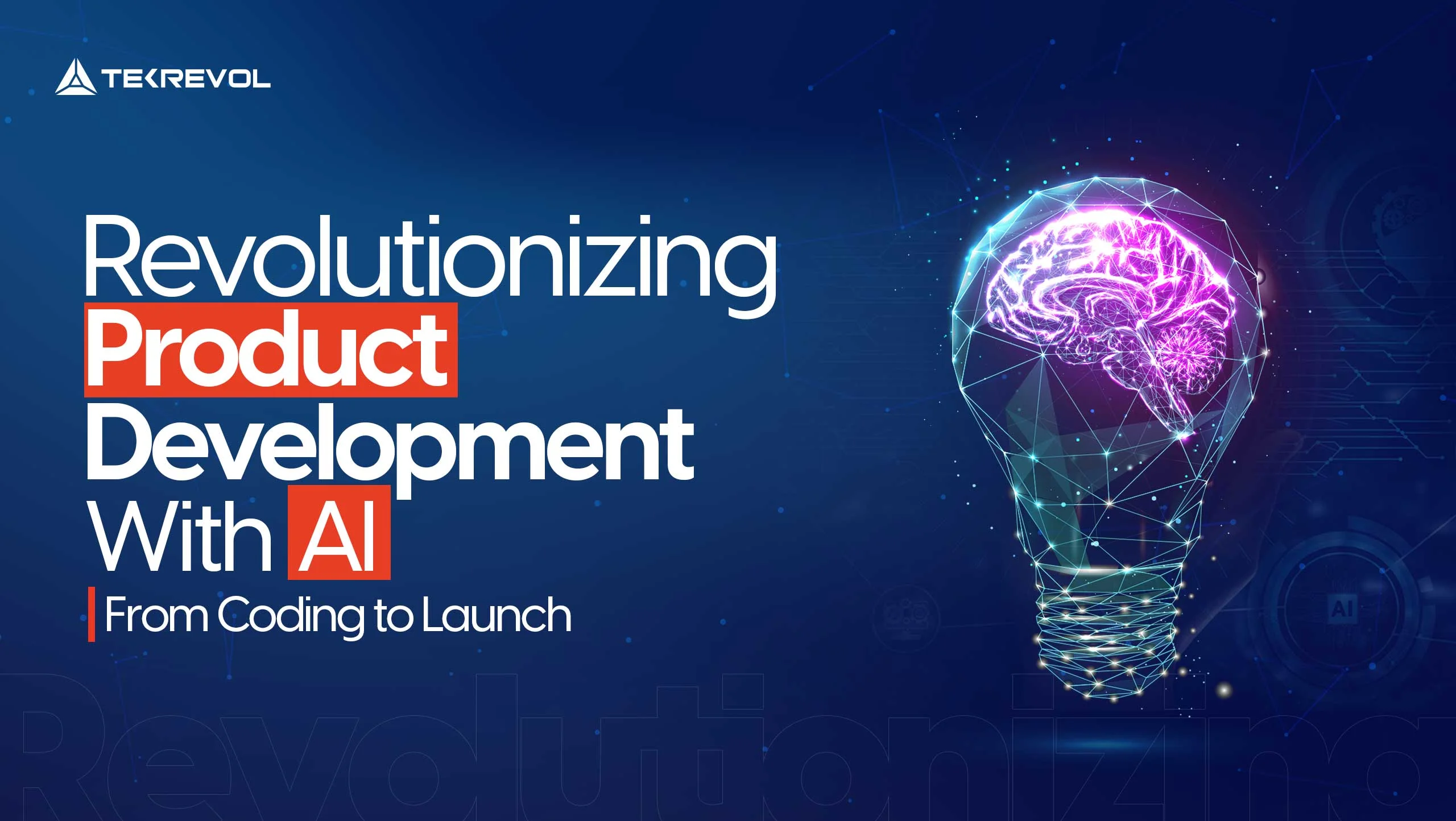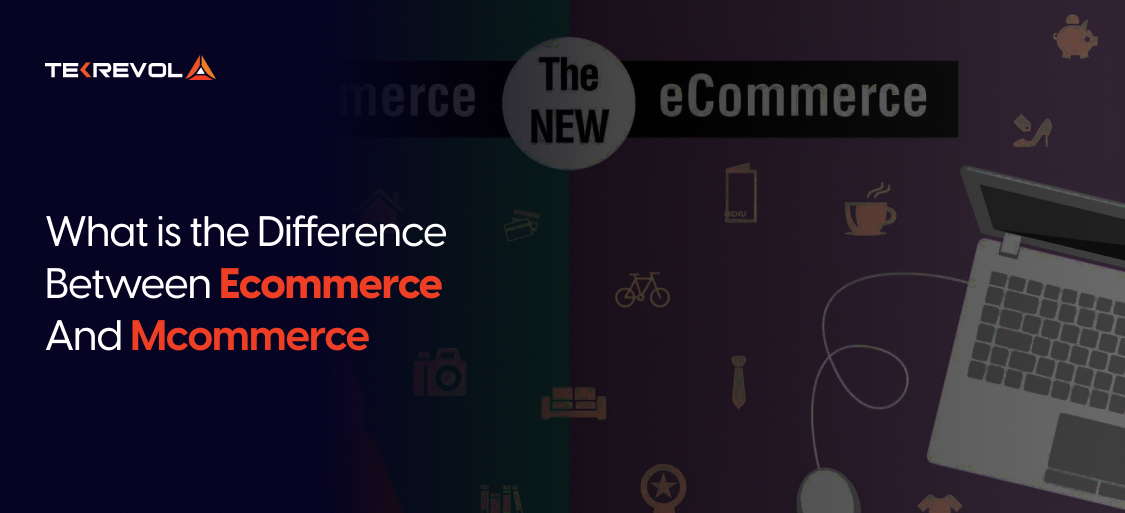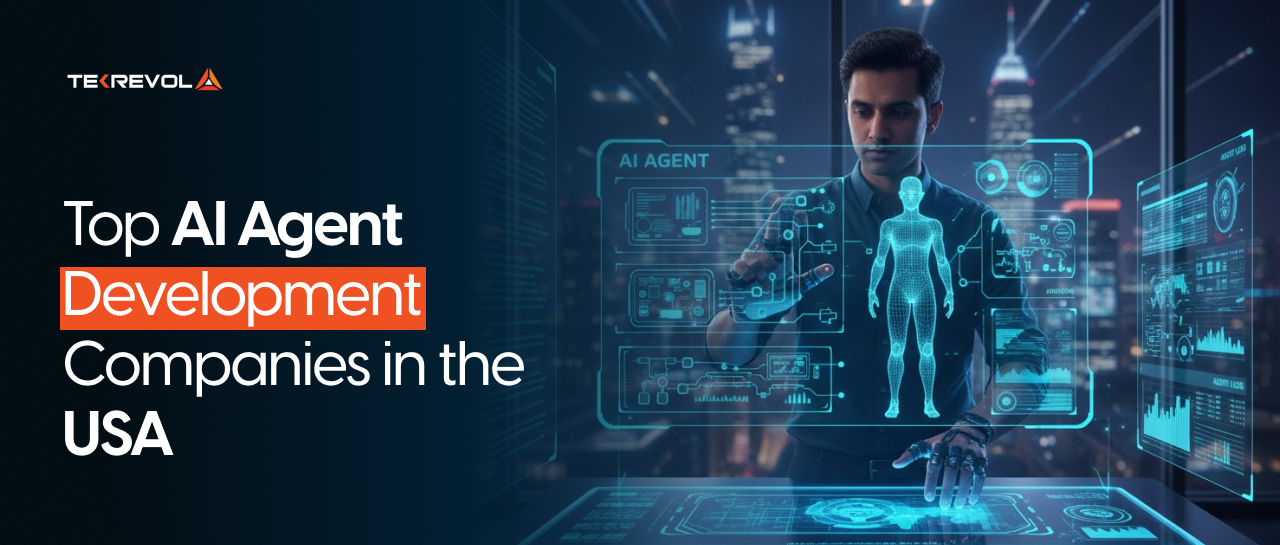AI isn’t just assisting humans anymore- it’s taking the wheel. We are so done with feeding data to AI to just make sense of it, but driving AI to make informed decisions, paving the way for faster and smarter business strategies.
This evolution into actionable AI is reshaping industries at lightning speed, but it is also bringing new complexities that demand attention. Businesses aren’t just witnessing change – they’re living it.
According to Deloitte, 67% of companies are ramping up their AI budgets, and it’s easy to see why. In sectors like retail, generative AI has already proven its worth – tracking customer trends, predicting demands, and even spotting supply chain hiccups before they spiral out of control.
Now, Salesforce is taking things a step further by using actionable AI to predict not only the future but also shape it. It’s time to get ready for what is more than an upgrade but a total banger!
Let’s explore what intentions Salesforce has toward Generative And Actionable AI.
Understanding Generative AI In Salesforce
Generative AI is the creative brain of the artificial intelligence world that comes with the outstanding ability to produce content, ideas, and insights at scale.
In the Salesforce ecosystem, AI development companies and generative AI solutions have changed everything about how businesses use AI for their CRM systems.
Today, It is like hiring a multitasker who can draft emails, predict customer behavior, and identify sales opportunities – all of that in real-time.
What Is Generative AI?
To know more about the ongoing evolution, you need to get your hands dirty by knowing what Generative AI is. Well Gen-AI is the latest AI that feeds itself on existing information to create new data, whether that’s text, images, or even predictive models.
It’s an assistant that not only analyzes customer data but also crafts personalized content based on it.
In the Salesforce world, generative AI helps businesses:
- Draft automated emails for personalized marketing campaigns.
- Create data-driven customer insights for sales teams.
- Suggest next steps based on historical and real-time data.
Let’s learn from an example – a retailer with AI-powered data analytics can employ generative AI to examine a customer’s shopping history and generate personalized discount offers automatically. This AI-driven customer engagement wouldn’t only foster loyalty but will surely contribute to increasing sales.
Generative AI Solutions in Salesforce’s CRM Systems
Salesforce AI is not merely about getting numbers; it’s about transforming data into meaningful content and recommendations. Some of the roles of Generative AI include:
- AI Generation of Actionable Insights: Whether it is predicting the next purchase by a customer or identifying trends in sales data, generative AI not only analyzes but delivers.
- Personalized Customer Experience: Tailored marketing messages and real-time customer service responses that feel custom-made for every user.
- Streamlining AI Automation in Salesforce: Automation of repetitive tasks, such as creating follow-up emails, saves time for teams to focus on strategic goals.
Generative AI in Business Operations
Generative AI has become the core of advanced AI in business operations. Here’s how it makes a difference:
- Marketing: AI tools can write ad copy based on customer personas, ensuring every campaign hits the mark.
- Customer Service: Generative AI for customer service empowers chatbots that interact like a human and resolve queries quickly.
- Sales Optimization: Helps sales teams prioritize leads by analyzing and generating detailed customer profiles.
- Want To Supercharge Your Salesforce Potential?
- TekRevol helps businesses implement tailored AI-driven solutions to drive results and optimize operations.
What Is The Transition To Actionable AI?
If generative AI is like the creative brain of the operation, actionable AI is the kind of muscle that gets the job done. Generative AI solutions focus on how to create content, ideas, and insights, meanwhile, Actionable AI gathers all of that output and gives a new life to your business.
This shift from being creative to getting practical is what makes Salesforce shine as a leader in using AI for CRM systems, as it perfectly blends both AI technologies to supercharge business operations.
Generative AI vs. Actionable AI: What’s the Difference?
It’s tempting to think that Gen AI and Actionable AI are interchangeable technologies. However, they were built to perform very different tasks. One could think of the two this way: generative AI could help draft the greatest marketing email for a holiday sale, whereas actionable AI will ensure that the very email goes to the proper target audience, triggers follow-up messages for non-responsive leads, and monitors engagement metrics so as to fine-tune your strategy.
Here’s a quick rundown of what they do:
- Generative AI: It creates content such as emails, scripts, or reports.
- Actionable AI Applications: They carry out tasks, automate workflows, and make data-driven decisions.
Why do Businesses Need Actionable AI?
The real magic happens when actionable AI solutions step in to transform insights into outcomes. It’s what bridges the gap between data analysis and real-world action.
With Salesforce AI-powered automation, businesses can:
- Launch marketing campaigns triggered by real-time events.
- Use AI-powered data analytics to adjust inventory levels dynamically.
- Automatically assign service tickets to the right team for faster resolution.
Salesforce’s Actionable AI Innovations
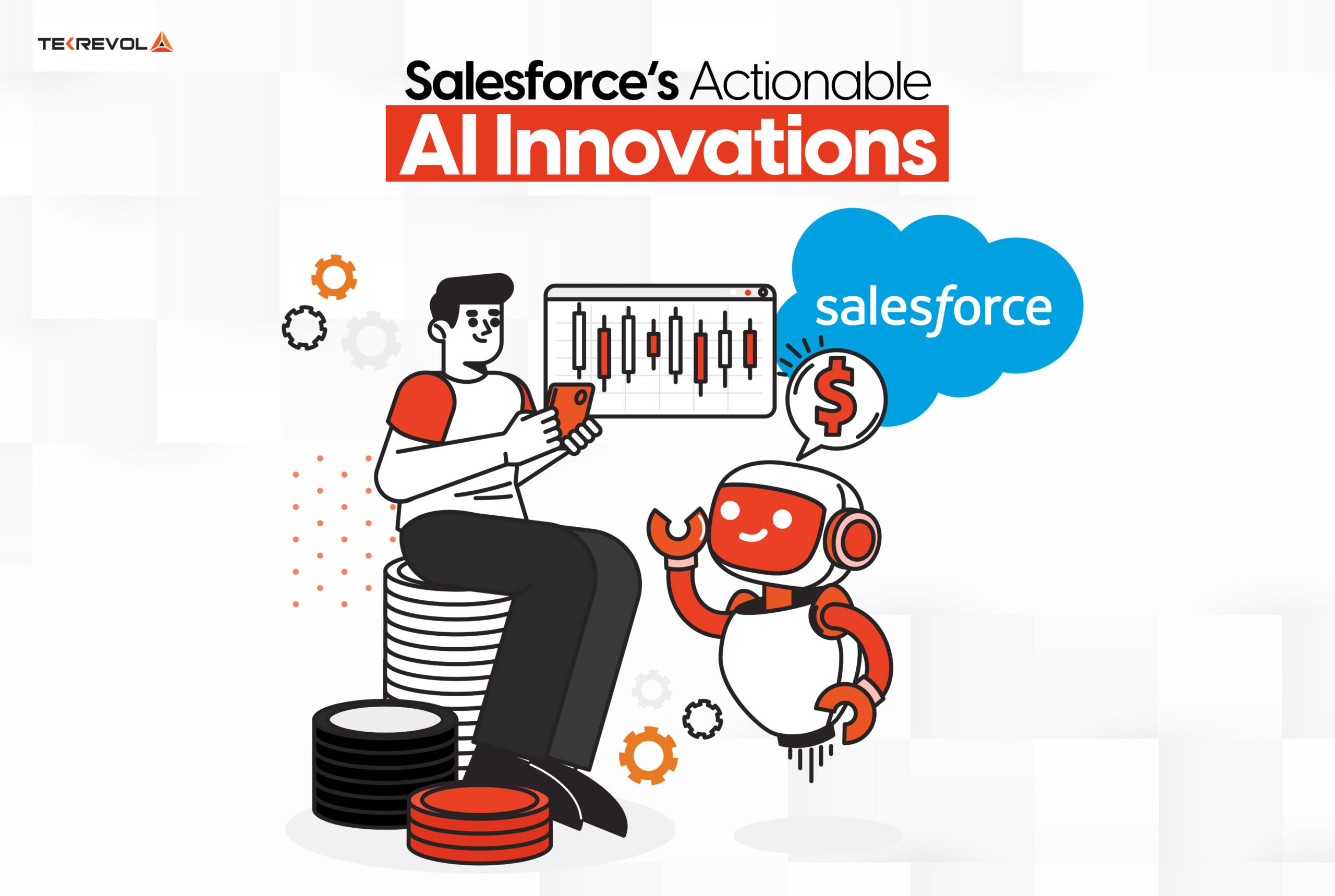
Salesforce’s journey from generative AI to actionable AI has undergone several breakthrough innovations to reshape traditional CRM systems and business practices.
These innovations focus more on turning AI-driven insights into real-world actions, helping businesses save time, be efficient, and increase customer satisfaction.
Below are the essential, actionable AI tools and features that Salesforce has introduced to the world.
1. Salesforce Flow
What It Does:
Salesforce Flow is a powerful tool that automates workflows and processes across different business functions. It ensures that repetitive tasks such as assigning service cases, sending follow-ups, or updating records are automatically handled.
How It Helps:
- Increases the speed of task execution.
- Reduces the possibility of human error.
- Gives teams more time to focus on strategic initiatives.
2. Tableau for AI-Powered Data Analytics
What It Does:
Tableau integrates actionable AI into its advanced analytics platform. It doesn’t just visualize data; it provides actionable insights with AI, recommending the upcoming steps for businesses should take based on trends and predictions.
How It Helps:
- Enhances decision-making with real-time insights.
- Identifies bottlenecks in workflows and suggests solutions.
- Aligns sales, marketing, and operations teams with shared data insights.
3. Service Cloud with Predictive Analytics
What It Does:
By integrating predictive analytics with AI, Salesforce’s Service Cloud forecasts customer needs, allowing businesses to address issues preemptively. It powers features like intelligent case assignment and resolution suggestions.
How It Helps:
- Resolves customer issues quickly.
- Anticipates customer concerns for proactive support.
- Improves service team efficiency.
4. Marketing Cloud with AI-Powered Campaigns
What It Does:
The Marketing Cloud combines actionable AI applications to run marketing campaigns automatically. It adjusts the messaging, timing, and offer dynamically based on customer behavior.
How it Helps:
- Personalized content boosts engagement
- Data-driven insights optimize campaign performance.
- Maximizes ROI on marketing
5. Sales Cloud with Lead Scoring and Prioritization
What It Does:
Salesforce’s actionable AI tools in Sales Cloud use machine learning in Salesforce for scoring leads, prioritizing those based on the likelihood of conversion, and automating follow-up activities.
How It Helps:
- Enables sales teams to focus on high-value leads
- Increases conversion rates through smart targeting
- Reduces wasted time in unqualified leads.
A Quick Summary of Salesforce Actionable AI Innovations
| Innovation | Function | Benefits |
|---|---|---|
| Salesforce Flow | Automates workflows and repetitive tasks | Saves time, minimizes errors, and boosts efficiency |
| Tableau with AI Analytics | Provides real-time actionable insights from data | Improves decision-making and aligns teams with shared insights |
| Service Cloud with Predictive Analytics | Anticipates customer needs and automates case resolution | Enhances service speed and customer satisfaction |
| Marketing Cloud with AI Campaigns | Automates and personalizes marketing campaigns | Increases engagement and ROI through dynamic adjustments |
| Sales Cloud with Lead Scoring | Uses AI to score and prioritize leads | Increases conversion rates and streamlines sales processes |
Challenges and Considerations
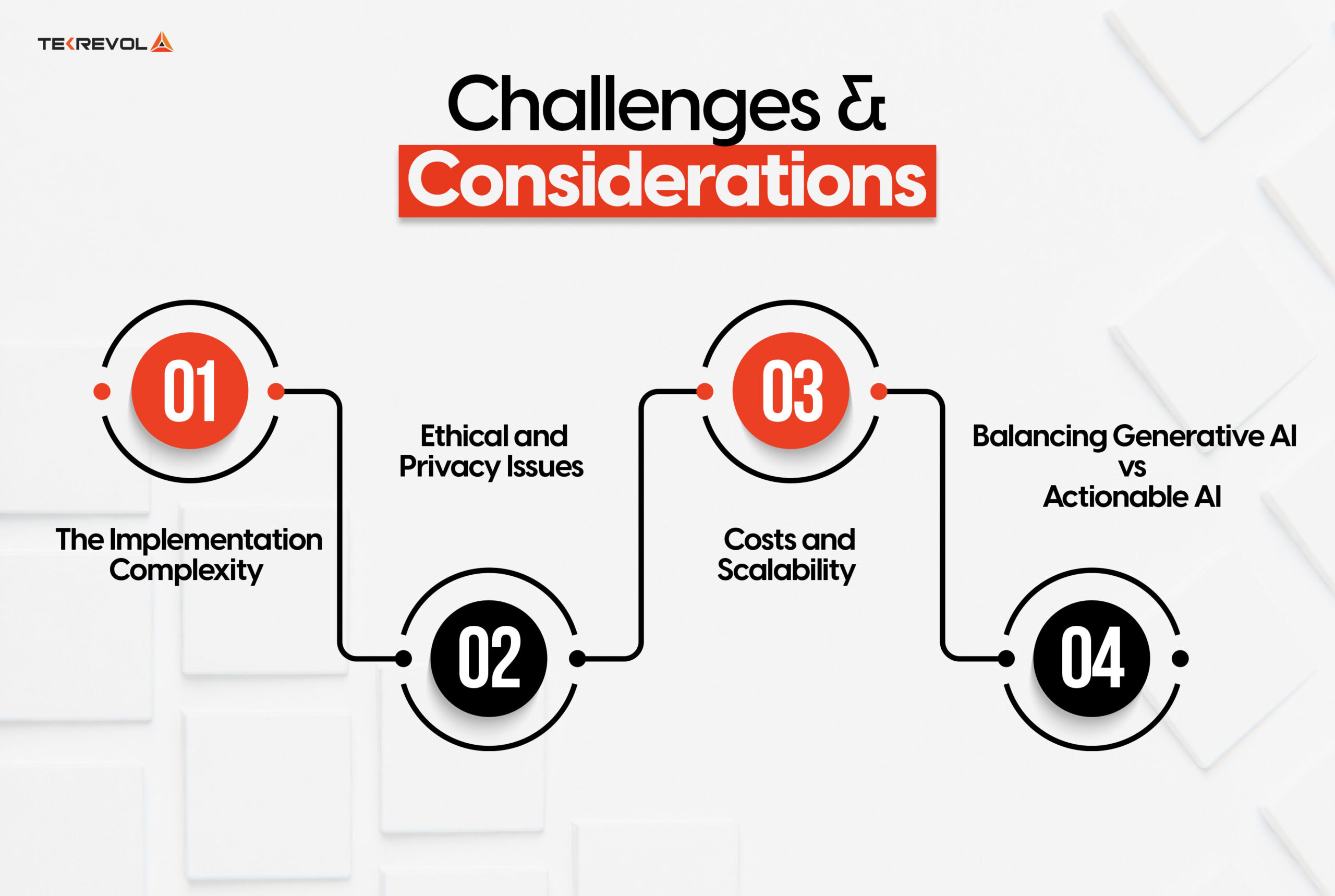
As groundbreaking as actionable AI applications in Salesforce can be, they don’t come without a fair share of challenges. From technical complexities to ethical dilemmas, businesses should tread carefully.
After all, adopting advanced AI in business operations is not as simple as plugging software and watching magic happen – it is a journey that comes in handy with a few speed bumps along the way.
1. The Implementation Complexity
Getting Salesforce AI tools off the ground can be more of a walk in the park than people expect. Sure, they are designed to simplify workflows, but what about the installation process? You didn’t think about it, right?
Implementing AI automation in Salesforce needs:
- Skilled personnel who will configure and monitor the AI systems
- Major investment in training the teams to use the AI tool effectively.
- Integration with the current legacy systems
Why It’s Worth It:
Organizations that can effectively and successfully introduce AI innovation to CRM witness an increase of 25% faster completion of projects. And you, too, want that, right?
2. Ethical and Privacy Issues
Let’s talk about the elephant in the room – data privacy. Processing huge amounts of customer information is part of using AI-powered data analytics. But where is the line between personalization and invasion of privacy?
The key challenges include:
- Bias in AI Models: Algorithms trained on skewed data may inadvertently perpetuate biases.
- Data Protection Compliance: GDPR and other privacy regulations can make data collection and usage complex.
- Customer Trust: Over-automation in AI-driven customer engagement might feel impersonal, leaving customers frustrated instead of satisfied.
The Fix:
Salesforce urges businesses to be ethical with AI practices, such as transparency in AI decision-making and compliance with data laws.
3. Costs and Scalability
Yes, AI is slick, but not cheap. From the acquisition of licenses for Salesforce AI-powered automation tools to keeping up with the infrastructure, costs add up quickly.
Small businesses might struggle, particularly in terms of justifying upfront investments and scaling AI tools with adequate resources.
The good news?
The role of AI in digital transformation continues to grow, and as the technology matures, costs are expected to decrease over time.
4. Balancing Generative AI vs Actionable AI
One of the more philosophical dilemmas in AI use cases in Salesforce is when to draw the line between generative AI solutions (creation) and actionable AI applications (execution).
- Over-reliance on generative AI for customer service might lead to terrible interactions.
- Under-utilizing actionable AI means missing out on the full potential of predictive analytics with AI and other benefits.
How To Fix:
Finding the right balance ensures businesses get actionable insights with AI without losing the human touch.
- Finding it Difficult To Manage Your Sales Force?
- No Worries, Our Expert Are Here To Help!
Future Prospects of AI in Salesforce
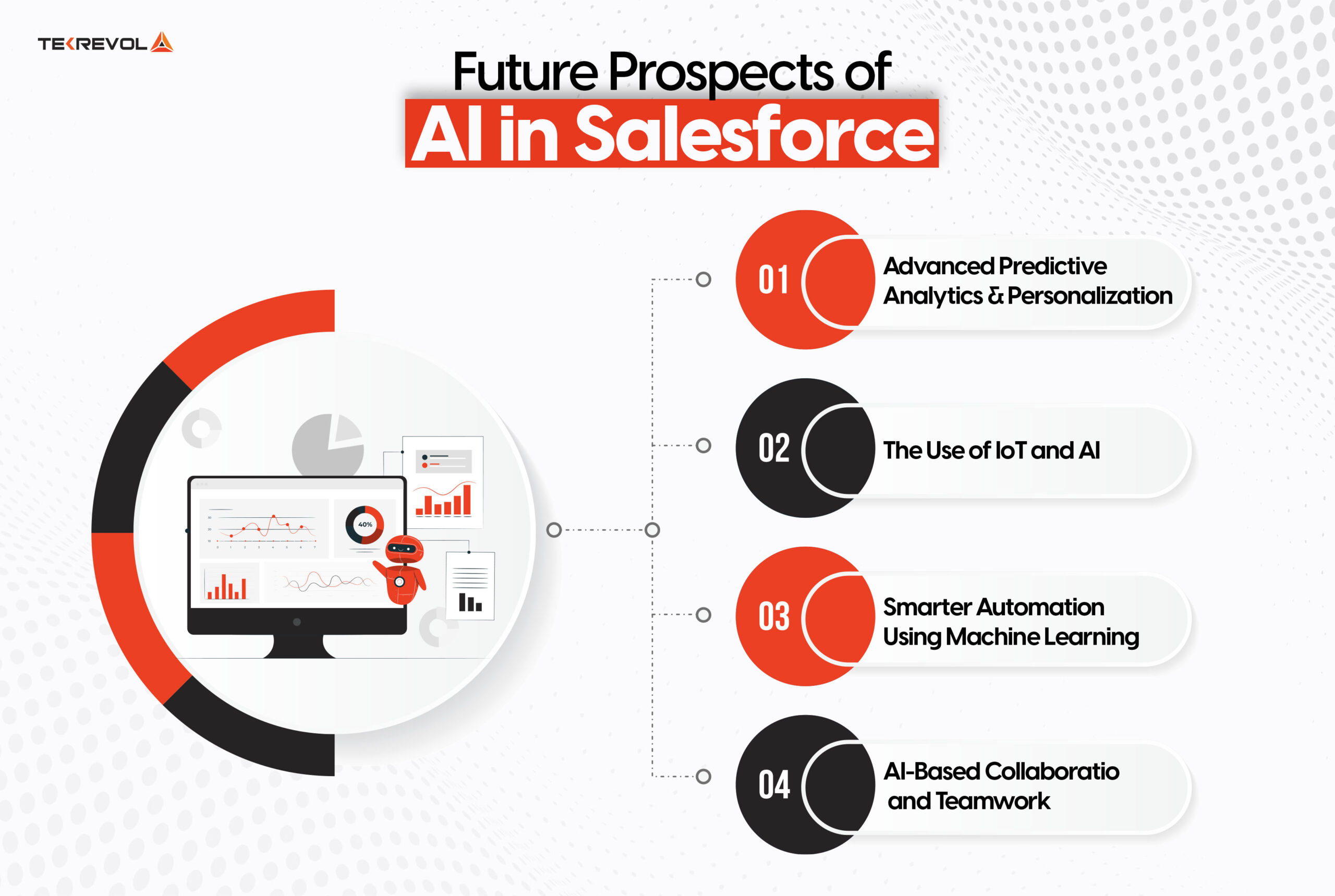
The future of AI innovation in CRM isn’t only bright but glowing with potential you can’t even imagine. Today, salesforce has positioned itself at the front of AI evolution, and its roadmap shows that we are only just beginning to scratch what is possible.
With advancements in machine learning, AI-powered data analytics, and AI automation in Salesforce, businesses can look forward to even smarter tools that redefine how we approach customer relationships, operations, and decision-making.
1. Advanced Predictive Analytics and Personalization
In the future, Salesforce will drive the limits of predictive analytics with AI to provide more accurate results. By 2030, AI-powered personalization is expected to enhance the global business revenue rate by 15% itself.
Imagine a CRM that predicts not only customer needs but also finds opportunities you never knew existed.
- Hyper-Personalization: AI will dynamically tailor every customer interaction, from marketing campaigns to service experiences.
- Proactive Strategies: Due to AI-driven business insight, businesses can adapt real-time strategies on the move as a response to fast-moving market changes.
2. The Use of IoT and AI
The role of AI in this digital transformation will deepen when Salesforce integrates the Internet of Things (IoT) data into its CRM system. This level of integration will give businesses unprecedented insight into their operations and customers’ needs.
- This means that Salesforce would be able to monitor devices for customer performance issues and automatically trigger service workflows.
- It will also combine IoT and AI-powered data analytics as a means of predicting maintenance problems in industries such as manufacturing and healthcare.
3. Smarter Automation Using Machine Learning
SalesForce’s advanced AI in business operations will enable even smarter automation. Tools that are underpowered to carry out mundane tasks will advance into managing complex decision-making processes.
Some examples include:
- Intelligent Supply Chain Management: Automatically adjusting logistics to conditions from the weather or geopolitical issues.
- Scalable AI Automation in Salesforce: Personalized email campaigns with millions of users. It will be monitored for performance, and adjustments will be made in real time.
4. AI-Based Collaboration and Teamwork
AI is not only good at crunching numbers but also giving a meaningful analysis out of it. AI use cases in Salesforce go much beyond that. Though you can think of AI as the ultimate project manager, here is what AI can mean to the future of your business.
- Imagine AI providing actionable insights during meetings.
- Developing follow-up tasks using discussion points.
- Ensuring cross-functional goals with shared data and analytics.
How TekRevol Can Help in Bringing the Salesforce Evolution
TekRevol specializes in helping businesses use the full potential of Salesforce AI tools to stay ahead in the competitive landscape. Whether it is the implementation of actionable AI applications, integration of AI automation in Salesforce, or utilization of predictive analytics with AI, TekRevol strives to provide you with solutions that are tailor-made according to your needs.
Our specialty is streamlining the role of AI in digital transformation, ensuring that AI-based data analytics is integrated without any hassles into your CRM systems. From workflow to AI-driven customer engagement enhancement, TekRevol is here to guide you all the way.
If you really want to unlock the next level of AI innovation in CRM and transform how your business interacts with customers, analyzes data, and automates processes – you really need to talk to us once!

